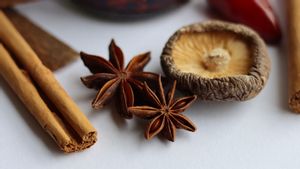YOGYAKARTA A popular star to cook because it has a umami flavor. It is estimated that the global functional fungal market will increase to more than 19 billion dollars by 2030, reported by the Allied Market Research. However, because there are so many types of mushrooms, it is important to understand what types of functional mushrooms contain adaptogenous and non-toxic? Check the following explanation.
The mushrooms have hundreds of varieties, unfortunately some of which are very toxic and some have psychedelic effects. Several other kinds of mushrooms, as we know, can be eaten, healthy, and perfect ingredients for culinary. There are also fungi varieties that have functional health benefits, these are called functional mushrooms. According to a certified dietist reported by RealSimple, Sunday, December 1, fungi functionals have adaptogenic properties and health benefits that are more than just nutritional values.
Adaptogens are non-toxic properties, especially in plant extracts that are thought to enhance the body's ability to fight stress and improve the normal physiological function. Adaptogens refer to a group of compounds found in plant foods that help the body adapt to stress in any form, be it chemistry, biology, or physical. That means, the content in these mushrooms helps us ward off certain stressor-induced diseases and maintain the body's internal homeostasis. What types of adaptogenic mushrooms are these? Here's the list.
Lionery mushrooms are one of the types of functional fungi that have the ability to affect brain health thanks to their neurotropic properties. Neurotropic factors encourage the growth and differentiation of neurons, nerve cells in the brain that send and receive information. Lion union mushrooms are also associated with reduced inflammation of the brain as well as cognitive reduction and slowdown in Alzheimer's patients.
In addition to being useful for the brain, lion seedling mushrooms are also useful for anti-inflammatory, anti-bacterial, and anti-cancer. These mushrooms also include good sources of vitamin B, zinc, potassium, and iron. The content supports a healthy energy metabolism.
SEE ALSO:
Chaga mushrooms may be difficult to find in fresh conditions. These mushrooms are likebularies and have orange interiors such as turmeric. According to a review of the study, chaga mushrooms are proven to be antioxidant, anti-inflammatory, anti-viral, and useful for lowering cholesterol. These mushrooms are also a source of beta-glucans, vitamin D, zinc, vitamin B, copper, manganese, and good potassium. But chaga mushrooms are not recommended to be consumed excessively over time because they contain oxalats that cause kidney stones.
Tramella mushrooms are also known as snow mushrooms with fine texture and braided shape. Tramella is a fungal variety that can most likely only be found in supplements, either powder shapes, tingtur, or capsules. One review that proves about these mushrooms published in 2023 shows that tremella mushrooms have antioxidant, anti-tumor, immunomodulation, blood sugar controllers, and neuroprotective properties. Similar to other mushrooms discussed here, trella also offers vitamin B, vitamin D, zinc, copper, calcium, and iron, which supports healthy immunity, bones, and blood cells.
In China, reishi mushrooms are also added in food so that they are popular. In traditional medicine, reishi mushrooms are also believed to improve health and longevity. Research has shown that this fungi is therapeutic for inflammation of the body, diabetes, neurological disorders, heart disease, cancer, and mood disorders.
shiitake mushrooms contain many important vitamins and minerals, including vitamin B, copper, and selenium. This is important to maintain energy levels and support the immune function. In 100 grams of shiitake mushrooms, it contains 2.5 grams of food fiber that contributes to digestive health. One of the most well-known compounds in shiitake is lentinants, beta-glucans that have been studied its ability to fight infection. Lentinants are also shown to be beneficial in supporting cardiovascular health in diabetics.
The next functional mushrooms, areement mushrooms which are a source of vitamin B, especially niasin, riboflavin, and pantotenetic acid. This vitamin supports energy production, helps digestion, and improves brain function.
Tiramic mushrooms are also a good source of minerals such as potassium, copper, and iron, which is important for maintaining muscle function. In addition, low calories are rich in food fiber so that it supports digestive health.
Through the explanation above about the type of mold that is adaptogenous and not toxic, has there ever been any consumption? Tiramic mushrooms and shiitake mushrooms, seem to be the easiest to process and find in Indonesia in fresh form.
The English, Chinese, Japanese, Arabic, and French versions are automatically generated by the AI. So there may still be inaccuracies in translating, please always see Indonesian as our main language. (system supported by DigitalSiber.id)


















